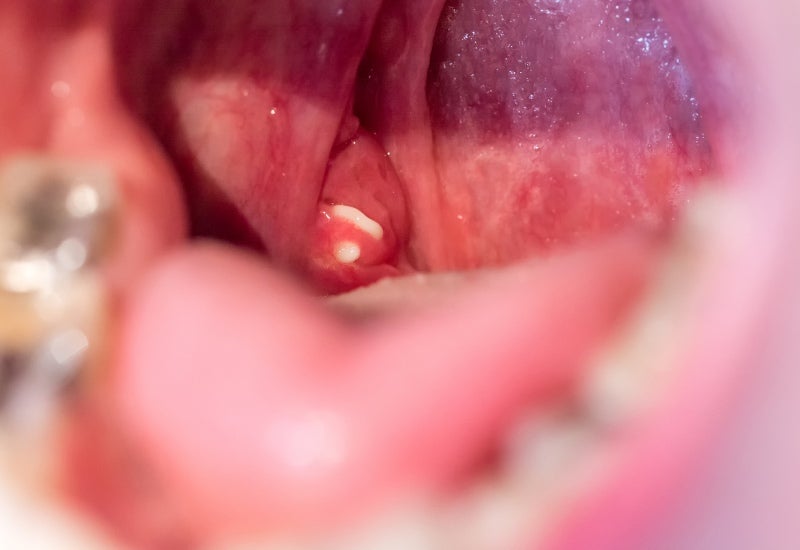-
Tonsil Stones: Enemy of Fresh Breath
Tonsil stones, or tonsilloliths, are often an overlooked cause of bad breath and irritation. If you’ve recently noticed a bad taste in your mouth or discomfort in your throat, you might be dealing with this common yet puzzling problem. Fair City Mall Dental Care explains all you need to know about tonsil stones and their impact on your breath. Our team is committed to helping you maintain fresh breath and a healthier mouth.

What Are Tonsil Stones?
Tonsil stones are small, hardened deposits that form in the crevices of your tonsils. They are often caused by trapped debris like food particles, bacteria, or dead cells. Tonsil stones calcify over time, creating yellowish or white formations that vary in size. While they are generally harmless, tonsil stones can be a source of discomfort and are often associated with bad breath.
Symptoms of Tonsil Stones
Tonsil stones are visible as small white or yellow stones that may look like spots at the back of the throat. Besides visible spots, some of the most common symptoms of tonsil stones include:
- Throat Discomfort: You may feel like something is stuck in your throat.
- Difficulty Swallowing: Larger stones can cause pain or make swallowing harder than normal.
- Ear Pain: Although rare, some individuals experience earaches caused by pressure on nerves in the throat.
- Bad Breath: Tonsil stones often produce a strong, unpleasant odor.
- Chronic Cough or Irritation: Tonsil stones can cause persistent throat clearing or mild coughing.
Why Do Tonsil Stones Form?
Tonsils have small openings known as tonsillar crypts. Debris accumulates in these pockets, such as food particles, mucus, and dead cells. Over time, this debris can calcify, resulting in the formation of tonsil stones. The most common tonsil stone causes include:
- Poor oral hygiene
- Chronic allergies or sinus issues leading to post-nasal drip
- Recurring tonsillitis
- Dehydration, which reduces saliva flow and helps debris build-up
How to Check for Tonsil Stones
Checking for tonsil stones is relatively simple. With good lighting and a mirror, open your mouth wide and examine the back of your throat. Look for small, white, or yellow deposits on your tonsils. If they’re difficult to spot, but you feel throat discomfort or notice bad breath, consult our dental team for confirmation.

Are Tonsil Stones Harmful?
For the most part, tonsil stones are harmless and just a nuisance. However, persistent or large stones can cause discomfort and potentially lead to infections. While occasional tonsil stones are normal, consult a doctor if you experience chronic pain, recurring infections, or difficulty swallowing.
How to Remove Tonsil Stones
You can remove minor tonsil stones at home. The best ways to quickly remove tonsil stone include:
- Gargling with Saltwater: A warm saltwater rinse can help dislodge smaller stones and reduce bacteria.
- Using a Tongue Scraper: If the stone is visible, gently dislodge it using a clean toothbrush or a cotton swab. Avoid using excessive force to prevent injury.
- Hydration: Drinking plenty of water can naturally help flush out debris.
How to Prevent Tonsil Stones
The best way to prevent tonsil stones is through impeccable oral hygiene. Some key habits to adopt include:
- Brush your Teeth Twice Daily: Remove food particles and plaque that may contribute to stone formation.
- Floss Daily: Clear out hidden debris between teeth.
- Use a Tongue Scraper: Clean your tongue to remove bacteria that can lead to bad breath.
- Gargle with Saltwater or Mouthwash: Rinse your throat regularly to clear out trapped debris.
- Stay Hydrated: Drinking water helps wash away food particles and prevents dryness.
When to Seek Medical Help
If tonsil stones persist, cause recurring symptoms, or become too large to remove at home, consult a healthcare professional. In extreme cases, an ear, nose, and throat (ENT) specialist may remove the stones manually or recommend other interventions, such as laser cryptolysis or tonsillectomy. While tonsil stones are typically benign, you should consult a doctor if you experience any of the following:
- Tonsil stones persist or cause frequent infections
- Severe pain that does not subside
- Difficulty swallowing or breathing
- Chronic sore throat lasting more than a month
- Repeated recurrences interfering with your daily life
Why Choose Fair City Mall Dental Care?
Fair City Mall Dental Care understands that tonsil stones may be an inconvenience that negatively impacts your quality of life. By adopting preventive measures and seeking professional help when needed, you can stay ahead of this issue while keeping your breath fresh and your smile healthy. Schedule an appointment with us today to address your tonsil stones and achieve a healthier, more confident smile.
